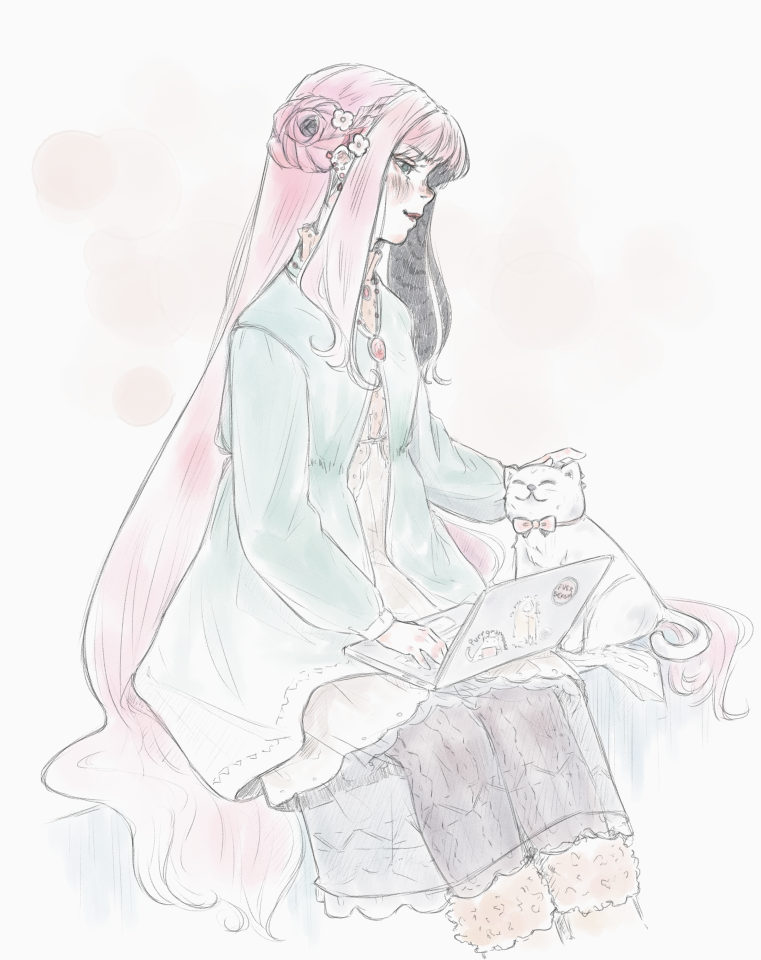Our dream.
 Chloe giving her cat, Snow, some well-deserved pets.
Chloe giving her cat, Snow, some well-deserved pets.
Imagine a world where creative uses of computers are accessible. Where experimentation is not only possible, but encouraged and supported. Where you’re in control of your own work, and of how it can be used. Where making mistakes is just that—it’s safe to fail, because failing doesn’t compromise your computer, accounts, or anything else.
The Lambda Garden is an ambitious research project to deliver exactly on these feelings: of bringing about an open, democratic, and safe set of computing tools for creative uses. Be it making interactive poetry, video games, or weird experimental art. We want to enable people to bring their own art into this world.
The project has been in discovery for the last 12 years, and will take several more to fully bring about. It spans everything, from hardware to end-user tooling, encompassing new programming languages, new game engines, and a new operating system; all of them guided by three core design principles:
1) Be moldable.
There’s no single tool that’s right for everyone—but people have an amazing capacity of adapting things to fit how they work. Even simple tools like a pencil see this—from the choice of colour, to the way they’re held, to the way one approaches the strokes. Different adaptations bring about what’s unique about everyone’s art.
Many digital tools have a very poor ability to be “molded” to one’s ways of work. Some may not allow you to add shortcuts, or to change how the UI is laid out, or to pick and organise your tools in a particular way, or maybe they’re just so complex that even if you wanted to adapt them, you wouldn’t know where to start!
In contrast, we approach design as a set of simple, combinable tools that can be molded by their user—and when just combining isn’t enough, they’re all open source, kept to strictly small codebases, and under a permissive licence. You can always read them, understand them, and modify them directly!
2) Support experimentation.
In order to figure out how art works for you, or to find what you want to do with art at all, you need to experiment. So, of course, any tool that wants to support art needs to support people’s needs for experimenting with it. That applies to our tools as well.
Experimentation is a broad subject and we rely on many areas of research (from mathematics to psychology and sociology) to figure out how to best support this, but this generally boils down to making it safe to experiment with anything, as well as providing rich and immediate feedback for whatever you’re experimenting with. Experimentation, after all, requires being able to quickly adapt and change course when things don’t feel right.
3) Made by humans, for humans.
The Lambda Garden is a social project. It could not exist without people, and it could not exist if not made for people. It’s people who have a need for expression. For experimentation. For safety.
The entire ecosystem in the project is thought through these lenses. This implies things like not having suggestion algorithms, of course, but also more subtle things like making sure applications can be used by people with different disabilities, or that anyone is able to publish a game or application (or piece of experimental art).
You shouldn’t need to be a big corporation in order to publish things; and you shouldn’t be at the mercy of their whims for the fate of your work, either. We approach design through a democratic and open lens, which also includes favouring decentralisation—so you can always be in control of your own work.